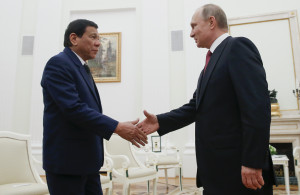Lawyer and international negotiator Antonio “Tony” La Viña said one of the reasons why President Rodrigo Duterte might face an International Criminal Court (ICC) case was because of the way he speaks.
“They’ll (ICC will) take the Philippine case seriously,” La Viña said during an INQ&A interview over Radyo Inquirer 990AM on Tuesday.
Last month, Jude Sabio, lawyer of confessed Davao Death Squad member Edgar Matobato, filed a communication before the ICC against Duterte and his men for committing crimes against humanity.
La Viña, former dean of the Ateneo School of Government, pointed out that even before the filing of the request to probe, the ICC had already issued a warning to the Philippine government amid reports of human rights violations resulting from Duterte’s anti-illegal drug campaign.
The ICC’s chief prosecutor, Fatou Bensouda, said Philippine officials “seem to condone such killings.”
Bensouda especially mentioned how inciting or engaging acts of mass violence is “potentially liable to prosecution before the court.”
La Viña said this was “because of the language of the President…language that many people, many legal people do not find acceptable.”
He said the situation of the Philippines was at a top concern at the ICC because they were always seeing it in the news.
“The prosecutors will most likely act on it because there’s a demand,” he said.
La Viña mentioned how the President would call for the death of drug addicts.
“It really does incite people to kill,” he said. “So as long as he talks like that there will be such concerns.”
Exhausting options
For his part, La Viña said it might be premature to ask the ICC to investigate the extrajudicial killings in the Philippines.
“I am actually against the case at this point. Because I feel that, as a lawyer, we have not done enough,” he said.
He explained that the ICC would only step in when a country’s legal system had already been maximized.
“I am not sure that we have completely maximized (the legal options),” he said.
But La Viña said it was not an absolute condition.
“Even if technically there are still options (and) in reality there are no more options (then they may file a communication),” he said.
He mentioned that many of the victims of alleged summary killings were poor and without access to lawyers unlike political prisoners during the martial law.
La Viña pointed out that the ICC was already monitoring the Philippines and a case could be filed even without Sabio.
Expedited process
La Viña said while the ICC process could last from months to years, the consideration of Jude Sabio’s communication “would be shorter than usual.”
“I think certainly the decision on whether they’ll do an investigation or not will come sooner rather than later, a year or so,” he said.
However, he believes that the actual trial might be after Duterte steps down from office.
The ICC could issue a warrant of arrest against Duterte but it would unlikely be served unless he would travel outside of the country “or his term ends and another president gives him up for trial,” La Viña said.
“My advice is (for Duterte and the other officials) to prepare for a case,” he said. “Prepare that there is going to be a preliminary investigation. And when it happens you cooperate.” /atm
